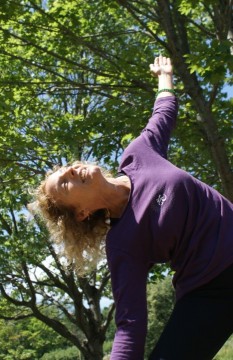
I took my last antidepressant in 1989. Through the 80s, I wore depression like a suit of armor, but you can’t exercise in a suit of armor, much less practice yoga. I had meditated since receiving a mantra in 1970 and had even practiced yoga postures from books and records, but it wasn’t until I took my first yoga class at Kripalu Center and learned to breathe deeply that I felt myself step out of the armor. Something shifted. As I dove forward with a deep exhalation into a standing, forward-bending pose (Yoga Mudra), after practicing a series of backbends with attention to sensation and breath, I knew viscerally, in a way I could not yet articulate, that the depressed fiction writer and poet was not all of me.
There were moments in that first yoga class when, through my focus on sensation and breath, I had a glimmer of my true nature through the fog of depression. Of course, I wanted more, and I left with audiotapes to guide me through a home practice, and returned to Kripalu often over the years.
Yoga didn’t push away despair or tamp down the numbing fog that often rolled in as I stumbled out of bed. In the early stages of my practice, my emotions flowed more, not less, even as I slowly began to welcome and accept feelings that had been repressed. In those days, I often cried on my mat, and the tears actually made me feel better. As my physical body was learning to let go of chronic tension through movement, breath and sound, my emotional body was releasing too, without a story attached.
I still cry on occasion, and I love it when I do. Yoga practice is about clearing the space, releasing what blocks me from knowing who I am beneath the visiting mood or the story I am telling myself. Crying supports that release, stimulating the cranial nerves, which is one physiological reason we all feel better after a good cry.
In gratitude for my own journey through the darkness, I became passionate about sharing what had helped me begin to sense into the me I was beyond my depression. I became a yoga teacher in 1992, collaborating with researchers, writing articles and then books to let people know how yoga practice freed me from the weight of my over-identification with my self-concept as an angst-ridden writer.
Over the past 25 years, I’ve studied with master teachers in India and the United States, and followed and contributed to the growing body of research on yoga and mental health, keeping practices simple and safe for my students and clients. However, the most authentic knowledge of what works to manage depression comes from the laboratory of my own body and my one-on-one work with students. For all of those years, I’ve practiced daily and worked with people, closely monitoring the effects of breathing, mudra, mantra, meditations or movements I’ve suggested. I have adapted and modified traditional practices. Even the language I use to introduce and guide those practices has changed, based on their effectiveness in empowering my students to manage their moods.
As we pay attention to sensation and breath as we practice, yoga teaches us to respond rather than to react to what is arising. We begin to embrace the everyday stresses, the life-altering losses, the unexpected betrayals, without clinging to the grievance or pushing away the natural feelings that arise in response. As the Buddha understood, our suffering makes us human. We can’t escape it. But through our practices, we can create more space around whatever is arising.
This article is excerpted from Darkness Before Dawn: Redefining the Journey Through Depression, edited by Tami Simons, Sounds True © 2014.